ZHÀO, to summon; SHÀO, a place name; a family name [B]
The meaning “to summon” comes by combining “mouth” for meaning with dāo 刀 (“knife,” 131, p. 27) for sound.
召开 zhāokāi to convene [B] L5
(MN) To summon with knife and mouth
ZHÀO, to summon; SHÀO, a place name; a family name [B]
The meaning “to summon” comes by combining “mouth” for meaning with dāo 刀 (“knife,” 131, p. 27) for sound.
召开 zhāokāi to convene [B] L5
(MN) To summon with knife and mouth

SHÀO, to join together [A]
Original meaning was to join threads. The “silk” radical suggests the meaning; zhào, shào (830, above) gives the sound.
介绍 jièshào to introduce [A] L2
紹

GUǍN, pipe; to manage; to guarantee; family name [B]
Original meaning was a bamboo pipe, thus the “bamboo” radical. Other meanings may be influenced by “官.”
管理 guǎnlǐ to manage [B] L4
管子 guǎnzi tube, pipe [C] L5
管道 guǎndào pipeline [C]

QUÀN, to exhort [B] L5
The “strength” radical gives the meaning in this character. The “right hand” is simply a scribble to replace the traditional complicated phonetic (see below, this frame).
劝告 quàngào to urge; exhortation [C]
劝说 quànshuō to advise [D]
勸

ĀN, be peaceful, be at ease; peace; to install; family name [A]
Some say that 安 is a famous meaning-meaning character: “one woman under your roof means peace.”
安心 ānxīn be calm; to focus your mind on [B]
安定 āndìng be secure, be steady [C]
安全 ānquán be safe; safety [B] L4
安全第一 ānquándìyī Safety first!
ÀN, to press with the finger or thumb; according to [B]
按时 ànshí be on time [A] L4
按着 ànzhe according to
按月 ànyuè by the month
按理 ànlǐ logically, …

ÀN, table; case at law; bill (legislative); legal record [B]
Ān (834) gives the sound; the “tree” radical suggests “table.”
方案 fāng’àn plan, program [B] L5
案件 ànjiàn law case [D] L6
案情 ànqíng details of a case; a case [D]
办案子 bàn ànzi to handle a legal case

QIÚ, to reach for; to beg [A]
求得 qiúdé to try to achieve [D]
乞求 qǐqiú to beg for, to implore [D] L6
求乞 qiúqǐ to beg
求亲 qiúqīn to seek a marriage alliance; to propose

JIÙ, to rescue, to save [B] L5
求救 qiújiù to ask for help
救生 jiùshēng to save a life
救火车 jiùhuǒchē fire engine

GUĀNG, light, brightness, be bright; only [B]; to make bright [C]; be bare; all used up; only (adverb) L4
阳光 yángguāng sunlight [B] L4
光明 guāngmíng light; be bright, be promising [B] L5
光亮 guāngliàng be bright, luminous [D]
光阴 guāngyīn time
用光了 yòngguāng le to be used up
LÙN, to discuss; theory; works like English suffix -ism to form words meaning “theory of” or “doctrine of,” e.g., “materialism,” “evolutionism,” etc. LÚN, first syllable in Analects (Confucian book) [A]
论文 lùnwén dissertation, essay [B] L5
无论 wúlùn no matter; regardless of… [B] L4
论点 lùndiǎn argument, thesis [D]
論

TÍNG, kiosk [C]
A sound-meaning compound. “丁” gives the sound, while the upper part is an abbr. of “高 tall.”
亭子 tíngzi kiosk, pavilion [D] L6
书亭 shūtíng bookstall
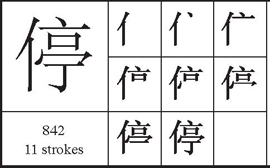
TÍNG, to stop [A]
A sound-meaning compound, 亭 may also help with the meaning.
停止 tíngzhǐ to stop (doing something) [B] L4
停留 tíngliú to tarry, stay for a while [C]
停车 tíngchē to park
停火 tínghuǒ cease-fire
暂停 zàntíng to suspend; (sports) a timeout

SUÍ, to follow; any, all; family name [B]
随便 suíbiàn at your convenience; as you like; be casual, be informal [B] L4
随时 suíshí at any time [B] L5
随手 suíshǒu conveniently; without trouble [C] L6
随后 suíhòu soon afterwards [C]
随意 suíyì at will [D] L6
随着 suízhe along with… [D] L4
隨
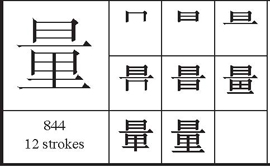
LIÁNG, to consider carefully; to weigh, to measure [B]; LIÀNG, quantity, volume, capacity [C]
The bottom part used to be 重 “be heavy” (323, p. 65), for the meaning; it has been corrupted into “village.” The “sun” 日 at the top was originally just an object being weighed.
量具 liángjù measuring tool
重量 zhòngliàng weight L5
BÈI, times, fold [A] L4
倍数 bèishù a multiple [D]
三倍 sānbèi three times as much, threefold
成倍 chéngbèi to double, be doubled
加倍 jiābèi to double

JIÀN, be cheap; be humble; be unresponsive [C]
The cowrie 贝 is here, as often, to suggest money, monetary value, value. 戋 jiān (211, p. 43) gives the sound.
贱卖 jiànmài to sell at a low price
贱骨头 jiàngǔtou (insulting) “rat,” low-life
賤

WĒI, danger; be lofty; family name [A]
The character is explained as “a man on top of a cliff, looking down at something that has fallen off.”
危机 wēijī crisis [B] L6
危楼 wēilóu tall building
病危 bìngwēi be critically ill

XIǍN, be dangerous; be difficult to get through or to [A]
危险 wēixiǎn be dangerous; danger [A] L4
冒险 màoxiǎn to forge ahead despite the danger; an adventure [D] L5
险些 xiǎnxiē nearly, almost
天险 tiānxiǎn natural barrier (e.g., a mountain)
險
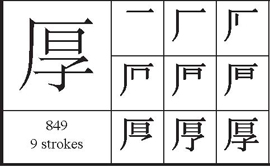
HÒU, be thick; be generous; family name [B] L4
厚实 hòushi (colloquial) be thick
厚道 hòudào be kind and honest
厚意 hòuyì kindness, thoughtfulness
厚脸皮 hòuliǎnpí “have thick skin on your face,” i.e., be brazen
JÌ, be finished; since, now that; already; a family name [B]
Originally the left part is a food vessel, the right part is a man turning his head away from it, hence “finished” eating.
既然 jìrán this being the case, … [B] L4
既...也... jì...yě... both… and… [B]
既...又... jì...yòu... both… and… [B]
既是 jìshì this being the case, …

CHÉN, be early; the fifth “earthly branch.” EARLY radical (187) [D]
辰 can mean “early” in the sense “early in the day” or “early in the year.” One modern scholar (Guo Moruo) thinks it is a picture of a stone tool used in ancient times to break the soil for cultivation. On the “branches,” see Lin Yutang’s Dictionary 1451f.
时辰 shíchén time, hour

CHÉN, morning [A]
This appears to be a meaning-meaning compound: “early” + “sun” (suggesting “day”) = “morning.”
晨光 chénguāng light of the morning sun, dawn
晨星 chénxīng a morning star

ZHÈN, to shake, to flap; to rise up with spirit [C]
振动 zhèndòng (physics) vibration L5
振作 zhènzuò to bestir yourself, get a move on

ZHÈN, to shake, to shock, to vibrate; to be very excited/shocked/astonished [C]
震动 zhèndòng to quake, shake, vibrate
震中 zhènzhōng (geological term) epicenter (i.e, of an earthquake)
地震 dìzhèn earthquake L5
CHÚN, lip, lips [C]
A sound-meaning compound. “Mouth” helps with the meaning.
上唇 shàngchún upper lip
下唇 xiàchún lower lip
唇舌 chúnshé squabble, argument
脣
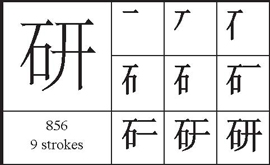
YÁN, to grind finely; to do research, to investigate thoroughly [A]
The “rock” radical 石 (749, p. 150) suggests the meaning; the rest of the character in former times helped with the sound.
研究 yánjiū to research, to deliberate
研讨 yántǎo to go deeply into, to discuss
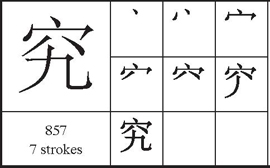
JIŪ, to look into, to probe [A]
Original meaning was to “squash” into a cave or “ferret” sth. out of a cave. “九” suggests the sound.
研究 yánjiū research, to do research; knowledge [A]
究办 jiūbàn to prosecute and settle a case
研究所 yánjiūsuǒ research institute, “think-tank” [B]
研究生 yánjiūshēng graduate student [C] L4

SHÍ, fruit; be solid; be true, real [A]
实现 shíxiàn to come true [A] L5
实在 shízài truly [B] L4
实用 shíyòng be practical [B] L5
实行 shíxíng to put into practice [B] L5
实话 shíhuà truth [C] L5
切实 qièshí be feasible; conscientiously [C] L6
实事求是 shìshíqiúshì Seek truth from facts! [B]
(MN) A head under the roof is solid
實

JIǍN, to be simple; to make simple, to abridge; letter correspondence [A]
A sound-meaning compound, originally meant “bamboo slip,” hence the “bamboo” radical.
简直 jiǎnzhí simply, frankly [B] L5
简便 jiǎnbiàn be simple and convenient [C]
简化 jiǎnhuà to simplify [D] L6
简易 jiǎnyì be simple and easy [D]
简要 jiǎnyào be brief and to the point [D] L6
簡
TÓNG, be the same; with, together [A]
同意 tóngyì to agree [A] L3
同学 tóngxué classmate [A] L1
同事 tóngshì colleague [A] L3
同样 tóngyàng be the same, be equal [B]
同屋 tóngwū share a room; room-mate [B]
同情 tóngqíng to sympathize with [B] L4
同胞 tóngbāo siblings/countrymen [C] L6
胡同 hútòng lane, alley (note: tòng) [C] L5

TÓNG, brass, copper, bronze [B] L5
The “side-gold” radical helps with the meaning. Tóng (860) gives the sound.
黄铜 huángtóng bronze
红铜 hóngtóng copper
铜像 tóngxiàng bronze statue
銅

DÒNG, cave, hole; incisively [B] L5
洞穿 dòngchuān to pierce; to understand thoroughly
洞穴 dòngxué cave L6

TǑNG, tube, large cylinder [C]
A sound-meaning compound—bamboo tube.

XUǍN, to choose; a choice; selections, an anthology [B]
选民 xuǎnmín voter [D]
选手 xuǎnshǒu contestant [D] L6
选取 xuǎnqǔ to choose [D]
选定 xuǎndìng to decide after careful selection [D]
文选 wénxuǎn anthology
普选 pǔxuǎn general election
(MN) Move ahead in the election
選
HŪN, dusk, darkness; to faint [B]
The top of this character used to be dǐ “foundation, bottom, go down” (bottom part of 底, 629, p. 126), and the character was a meaning-meaning compound: “go down” + “sun” = “darkness, dusk.”
黄昏 huánghūn evening
昏迷 hūnmí to faint L6

HŪN, marriage [B]
Hūn (865) gives the sound. The “woman” radical 女 helps with the meaning.
结婚 jiéhūn to get married [B] L3
离婚 líhūn to get divorced [B] L5
婚礼 hūnlǐ marriage ceremony L5

No pronunciation. Radical (6), “top of 刁”
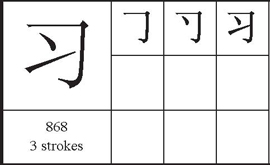
XÍ, to practice; practice, habit [A]
习惯 xíguàn be accustomed to; custom, habit [A] L3
习俗 xísú custom, convention [D] L6
习题 xítí exercises (schoolwork) [D]
习气 xíqì bad practice, evil habit
研习 yánxí to study
習

YǓ, wings. WINGS radical (183) [B]
A picture of two feathers.
羽毛 yǔmáo feather [D]
党羽 dǎngyǔ member of a clique (pejorative)
JIĀ, to add, to increase, plus [A]
加工 jiāgōng process (manufacturing) [B] L6
加以 jiāyǐ moreover [B]*
加入 jiārù to add; to join [C]
加热 jiārè heating [D]
加重 jiāzhòng to make/become heavier [D]
加快 jiākuài to speed up
(MN) Strength plus mouth

JIÀ, to harness; to pull (a cart); to drive, pilot, or sail (car, airplane, boat) [A]
The “horse” helps with the meaning; jiā (870) gives the sound.
驾驶 jiàshǐ to drive (a car, etc,.) L5
驾崩 jiàbēng death of a sovereign
駕

JIÀ, frame; a measure for airplanes [B]
Jiā (870) gives the sound; “tree” 木 helps with the meaning.
书架 shūjià bookshelf [B] L5
绑架 bǎngjià to kidnap L6
架子 jiàzi frame; outline; stance; hauteur [C]
打架 dǎjià to come to blows, to engage in fisticuffs, to fight; to brawl (with weapons or not)[ [C] L6
一架飞机 yíjià fēijī an airplane
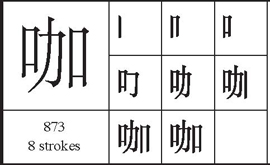
KĀ, GĀ, used to write foreign words [A]
咖 is used, for sound-value alone, to write such borrowed foreign words as “coffee.”
咖喱 gālí curry
咖啡 kāfei coffee L2
咖啡馆 kāfeiguǎn coffeehouse, café

CHĒNG, to weigh; name; CHÈN, to own; to suit [B] L5
称号 chēnghào title, designation [D] L6
名称 míngchēng name [D]
称道 chēngdào to commend [D] L6
简称 jiǎnchēng abbreviated name [D]
称心 chènxīn to suit one’s wishes [D]
稱
PÁNG, other; side; beside [A]
旁 gives the sound in several common characters (see below).
旁边 pángbiān beside; the area near [A] L3
旁人 pángrén other people
旁听 pángtīng to audit (a course)
旁白 pángbái aside (in a play)

BÀNG, to approach, be close to [B]
傍晚 bàngwǎn near evening; at dusk [B] L5
傍大款 bàngdàkuǎn to be a mistress for a rich man; to lean on a moneybag

BǍNG, announcement; a posted list of names [B]
Original meaning related to “billboard,” thus with the “tree” radical.
榜样 bǎngyàng model (for emulation), example [B] L6

BǍNG, upper arm; shoulder; PÁNG, to swell up; PÁNG, bladder [B]
The “meat” radical helps with the meaning.
膀子 bǎngzi arm
膀胱 pángguāng urinary bladder

BÀNG, pound (unit of weight); scales (for weighing); to weigh; point (in typography) [C] L6
The “rock” radical helps with the meaning of “weight” in this character.
磅秤 bàngchèng scales, platform scales
RÚ, be like; be as good as; according to; if [A]
如今 rújīn nowadays [B] L5
如果 rúguǒ if [B] L3
如同 rútóng be like, as [C]
如此 rúcǐ as follows [C]
如下 rúxià as follows, as below [C]
如意 rúyì be satisfied [D]
(MN) Be like a lady’s mouth

JUÉ, to decide; decidedly; to execute (a person); to burst [A]
Original meaning was “water breaching a bank” (see the traditional form below), other meanings by association.
决定 juédìng to decide; decision [A] L3
决心 juéxīn determination [B] L5
决口 juékǒu be breached; to burst (as, a dyke, a dam) [C]
决不 juébù be determined to do/not to do (something) [D]
決
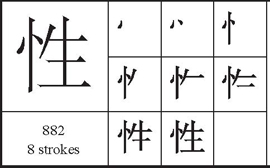
XÌNG, nature, temperament; sex [B]
“Heart” is for meaning, shēng “birth” for sound; or 性 and 生 are cognate words; or 性 combines meanings: what’s in you at birth, “temperament, disposition.”
性别 xìngbié sexual difference, sex [B] L4
性能 xìngnéng performance, function (of a machine) [C] L6
性情 xìngqíng temperament [D] L6
性交 xìngjiāo sexual intercourse

DĀI, be stupid; be idiotic; to stay, to remain [B] L5
呆板 dāibǎn be inflexible, rigid
呆子 dāizi stupid person; fool; enthusiast (see next item)
发呆 fādāi to stare like a fool, be in a daze L6
书呆子 shū dāizi “bookworm”
呆在家里 dāi zài jiālǐ to stay at home

BǍO, to protect; guarantee, surety [B]
保留 bǎoliú to retain; to hold in reserve [B] L5
保险 bǎoxiǎn insurance; be safe; be certain (to happen) [C] L5
保管 bǎoguǎn to take care of; surely [C] L6
保重 bǎozhòng Take care of yourself! [D] L6
保全 bǎoquán to keep intact; to preserve
(MN) To protect a stupid person
XIÀNG, toward, to face; habitually in the past; family name [A] L2 Distinguish from 尚 (478, p. 96).
向来 xiànglái always, all along [C] L6
向着 xiàngzhe to turn towards, to face; (colloquial) to take somebody’s side
一向 yíxiàng up till now; consistently
风向 fēngxiàng wind direction

XIǍNG, a sound; to sound [A] L4
响应 xiǎngyìng to respond [B] L6
响亮 xiǎngliàng be loud and clear; to resonate [C] L6
响声 xiǎngshēng sound, noise [D]
響
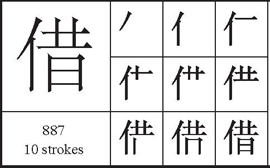
JIÈ, to lend; to borrow [A] L3
借口 jièkǒu to use as an excuse; excuse [C] L5
借入 jièrù to borrow
借出 jièchū to lend
借给 jiègěi to lend
借据 jièjù notes (receipts for loans)
借光 jièguāng Excuse me. (polite)
借过 jièguò Excuse me, (I’m) coming through.

SHÌ, to look, to look at [A]
Distinguish from the next two characters.
电视 diànshì television [A] L1
视觉 shìjué vision, visual sense [D]
视力 shìlì sight, vision [D] L6
視
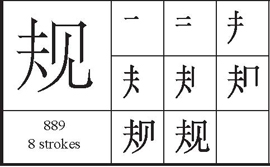
GUĪ, (drawing) compass; rule, regulation; to correct (a fault); fee [B]
Distinguish from the preceding (888) and following (890) characters.
规定 guīdìng to stipulate; to set, formulate [B] L4
规劝 guīquàn to admonish
校规 xiàoguī school regulations
規
GUĀN, to look at, view [A]
The “see” radical 见 gives the meaning. The “right hand” 又 is just a scribble to replace the traditional complicated phonetic element (see below). Distinguish from the preceding two characters.
观点 guāndiǎn viewpoint [B] L5
观念 guānniàn concept [C] L5
观看 guānkàn to watch [C]
觀

SHÈ, society [A]
This character combines meanings: “sign” + “earth” = “altar to the spirits of the land” (original meaning), “tutelary deity, village, society.”
社会 shèhuì society [A] L4
社论 shèlùn editorial; leading article [C]
社员 shèyuán a member of a club

DÙ, to pass through; degree, rule, extent; family name [A]
度过 dùguò to pass through (a period of time) [B]
高度 gāodù altitude [B] L5
度数 dùshù degree
度日如年 dù rì rú nián (because of anxiety or worries) days drag on for years

YÓU, to test with, be up to (someone); from, by; cause; family name [B] L4. FROM radical (143)
自由 zìyóu freedom [B] L5
由于 yóuyú be due to [B] L4
理由 lǐyóu reason [B] L2
由此可见 yóucǐ kějiàn “From this, it can be seen” (i.e., “therefore”) [D]

MÌNG, destiny, fate; life; order [B]
生命 shēngmìng life [B] L4
革命 gémìng to carry out a revolution; revolution [B] L5
命令 mìnglìng order, command [B] L5
命运 mìngyùn destiny, fate [B] L5
拼命 pīnmìng to risk your life; to give your all [B] L6
命名 mìngmíng to give a name to [D] L6
算命 suànmìng to tell somebody’s fortune
ZHǍN, to unroll; to open; family name [A]
发展 fāzhǎn to develop, development [A] L4
展开 zhǎnkāi to open out [B] L5
展出 zhǎnchū to unfold, an exhibition [B]
展望 zhǎnwàng look into the distance; look into the future; to predict [D] L6
展现 zhǎnxiàn unfold in front of your eyes [D] L6

TÌ, for, in place of, to substitute [B]
代替 dàitì to represent; representing... (i.e., in place of...) [B] L4
替代 tìdài to replace, substitute for [D]
替工 tìgōng substitute workman
替身 tìshēn substitute, scapegoat
替死鬼 tìsǐguǐ scapegoat
(MN) One big man “夫” says “曰” to another: “substitution!”

DIŪ, to lose [A] L4
Note that this character is simply 去 qù “to go” with a “left” radical over it.
丢人 diūrén to lose face [D] L6
丢脸 diūliǎn to lose face

TǏ, body [A]
(MN) A man’s root “本” is his body
身体 shēntǐ body [A]
体会 tǐhuì to have learned /to know/ from experience [B] L5
体面 tǐmiàn be pretty; be in good taste; honor; face, appearance [C] L6
体现 tǐxiàn to incarnate, to embody [C] L5
体力 tǐlì physical strength [C]
体重 tǐzhòng weight (of a person) [D]
體

SHÌ, sign. SIGN radical (132) [A]
A picture of an altar. Current meaning by association.
Compare this to the “side-sign” radical 礻 already learned (166, p. 34).
展示 zhǎnshì to show, to lay bare [D] L6
示意 shìyì to show what you mean or intend L6
ZŌNG, ancestor; law case; batch; family name
宗 combines meanings. “Roof” over the “sign” radical (used for spiritual manifestations) suggests the altar to the ancestors which every traditional family has in its home.
祖宗 zǔzōng ancestor
宗教 zōngjiào religion L5

YÍNG, to face; toward; to meet [A]
欢迎 huānyíng to welcome [A] L2
迎接 yíngjiē to receive or welcome someone [B] L5
迎面 yíngmiàn facing each other; the space opposite [D] L6

FÙ, to hand over, to pay; a set [A]
(MN) The “thumb” (representing a hand) hands over something to the “(side-)man”
对付 duìfu to deal with; to make do with [B] L6
付出 fùchū to pay; to expend [D]
付钱 fùqián to pay for the bill

FǓ, prefecture; palace [A]
政府 zhèngfǔ government [A] L5
府上 fǔshàng (your) residence (polite expression)
王府 wángfǔ royal palace
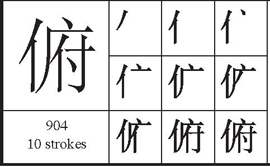
FǓ, to bow your head; “please condescend to ...” (old-fashioned honorific form used in official correspondence) [C]
俯视 fǔshì to overlook
俯首 fǔshǒu to bow your head and submit
FÙ, to attach; be near, close [A]
附近 fùjìn be near to [A] L3
附带 fùdài in passing; to attach; be supplementary [D]
附和 fùhè to echo (viewpoint, opinion); to chime in with [D] L6
附加 fùjiā to add, to attach; be additional, be attached [D]
附属 fùshǔ be subsidiary, be affiliated [D] L6

FÚ, symbol; written charm or incantation [B]
Original meaning was “bamboo tally.”
符合 fúhé to tally with; (term from physics) coincidence [B] L4
符号 fúhào symbol, insignia [D] L6

FǓ, to decay, turn rotten [B]
A sound-meaning compound, 府 suggests the sound while 肉 “meat” helps with the meaning.
腐化 fǔhuà to go rotten; to be depraved, degenerate; rot, decay [D]
腐败 fǔbài to rot, corruption L6

FÙ, second syllable of 吩咐 fēnfu, to give somebody an order (instruction), to tell somebody to do something [C]

SHĀN, streaks. STREAKS radical (63)
The character is a picture. Not in modern use as an independent character.
YǏNG, shadow, image, photograph [A]
影响 yǐngxiǎng to affect, to influence; influence, effect [A] L3
影子 yǐngzi shadow, reflection; trace [B] L5
阴影 yīnyǐng shadow, shade
影射 yǐngshè allude to; hint obliquely at; insinuate
电影 diànyǐng movie [A] L1
电影院 diànyǐngyuán movie-house [C]

RÉN, the ninth “heavenly stem”; family name
(MN) The character seems to show the “knight” carrying some object (the “left” radical) thrown over his shoulder
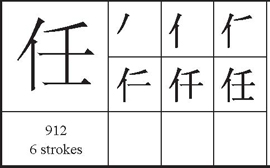
RÈN, to allow; term of office; responsibility; to employ; to endure; RÉN, family name [A]
任性 rènxìng be wilful; be wayward [C] L6
任意 rènyì wilfully; wantonly [C] L6
任命 rènmìng be appointed; be nominated [D] L6
任用 rènyòng to appoint
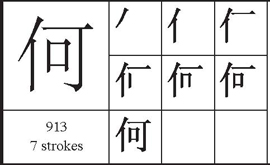
HÉ, what; family name [A]
任何 rènhé any [A]; whatever, whichever L4
如何 rúhé how? in what way? how about…? [B] L5
何必 hébì why must…? [C] L5
几何 jǐhé how much? how many? [D]
几何学 jǐhéxué geometry
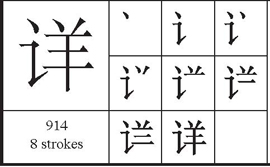
XIÁNG, in detail; to know [B]
Xiáng is supposed to be a sound-meaning compound, “words” giving the meaning and 羊 yáng (156, p. 32) giving—not the full sound, but—the rhyme.
详谈 xiángtán to discuss in detail
详情 xiángqíng detailed information
不详 bùxiáng be unknown
(MN) Speak to the sheep in detail
詳
XÌ, be fine (not coarse), be thin [A]
Note that the radicals in xì are the same as in 累 (49, p. 10), but the positions are different. Originally, xì had “silk” + “head” = “hair,” therefore “fine.” “Head” was corrupted.
详细 xiángxì be in detail [B] L4
细致 xìzhì detailed; meticulous L6
細
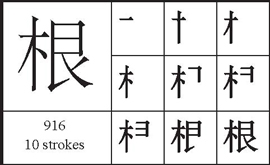
GĒN, root; square root; a measure for long, thin things [A] L5
A sound-meaning compound, the “tree” radical helps with the meaning.
根本 gēnběn be basic, be fundamental; from the beginning [B] L5
根据 gēnjù to base something on; according to; basis [B] L3
方根 fānggēn square root

SHǏ, history, historian; family name [A]
历史 lìshǐ history [A] L3
编年史 biānniánshǐ chronicle

SHǏ, envoy; to use; to cause; with [A] L3
使用 shǐyòng to use, to employ [A] L4
大使 dàshǐ ambassador [C]
使得 shǐdé to make; to cause; to be able to use; be all right [C]
使命 shǐmìng mission, assignment L6
大使馆 dàshǐguǎn embassy [B] L4

WÈI, flavor; odor; a measure for medicine and for courses (of a meal) [B]
味道 wèidao flavor [B] L4
气味 qìwèi smell, flavor [C] L6
味觉 wèijué sense of taste
玩味 wánwèi to think over, to ponder
(MN) The flavor is not in the mouth yet (未)
LUÀN, be disorderly, disorder [A] L4
内乱 nèiluàn civil strife; civil convulsions; internal disorders
乱说 luànshuō to speak recklessly; to gossip
乱真 luànzhēn be a good imitation (of a painting or sculpture)
(MN) A tongue with a “hook”—what a disorder
亂

PÀI, to branch off; to appoint; faction, sect; to levy; to distribute [A] L5
Subtract the “water-dots,” and you have an old character that was a picture of a stream dividing, from which came the meaning “to branch off.”
党派 dǎngpài political party [C]
派别 pàibié faction [D] L6
气派 qìpài manner, style
派头 pàitóu style, manner
派出所 pàichūsuǒ precinct house [C]

ZHÙ, to help [A]
A sound-meaning compound, “力 strength” helps with the meaning, “且” no longer suggests the sound in a good way.
帮助 bāngzhù to help, help [A] L2
助手 zhùshǒu helper, assistant [C] L6
助理 zhùlǐ assistant [D] L6
助长 zhùzhǎng to encourage; to abet [D]
借助 jièzhù using, drawing on, with the help of [D] L6
助教 zhùjiào teaching assistant

SHÈ, to establish; if [A]
设备 shèbei equipment [B] L5
设想 shèxiǎng to imagine; to take into account, have consideration for; rough plan, preliminary idea [C] L6
设立 shèlì to set up [D] L6
设法 shèfǎ to figure out a way; to try to
設
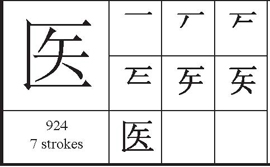
YĪ, to heal [A]
医生 yīshēng healer, medical doctor [A] L1
医院 yīyuàn hospital [A] L1
医学 yīxué medical science [B]
中医 zhōngyī Chinese traditional medicine [C]
(MN) Arrow 矢 in the quiver = arrow not in the body = to heal
醫
FÚ, clothes; to take, swallow (medicine); to serve; to obey; be accustomed to; FÙ, a measure for doses (term in Chinese medicine) [A]
衣服 yīfu clothes [A] L1
服从 fúcóng to obey [B] L5
说服 shuōfú to convince [C] L6

WÙ, affairs; must [A]
服务 fúwù to serve; service [A]
业务 yèwù business, professional work [B] L5
任务 rènwù mission, task [B] L4
医务 yīwù medical [D]
务必 wùbì without fail, whatever the cost L6
外务 wàiwù foreign affairs
服务员 fúwùyuán attendant [A] L2
務

JĪNG, essence, spirit; sperm; very; to be essential, pure; be smart [A]
精力 jīnglì personal energy, vigor [B] L5
精细 jīngxì be meticulous [C]
精通 jīngtōng to know very well [D] L6
精心 jīngxīn take pains in doing [D] L6
精美 jīngměi be exquisite [D]
精简 jīngjiǎn to simplify, retrench [D] L6
精神 jīngshén spirit, vitality [A] L4
精神病 jīngshénbìng mental illness, psychosis

NÚ, handmaiden, slave [C]
“又 hand” + “女 maiden.”
The character combines meanings.
奴才 núcái slave
奴性 núxìng be servile; servile disposition

NǓ, to strive, to work hard at [A]
This appears to combine meanings: use the strength or energy of a slave. Or it may represent an extension of meaning of the word behind 奴: “to slave at it.”
努力 nǔlì “put your back into it”; effort [A] L3
NÙ, anger, passion, rage [B]
怒 appears to combine meanings: the heart (emotions) of a slave: anger, passion, rage. Or, it may represent the feelings (of an owner) toward a slave.
发怒 fānù get angry
怒发冲冠 nùfàchōngguān to become so angry that one’s hair raised up his hat, to become extremely angry
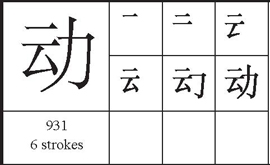
DÒNG, to move [A]
活动 huódòng be active, activity [A] L4
运动 yùndòng movement (physical), exercise; sports; campaign, movement (political) [A] L2
动人 dòngrén be touching (emotions) [B]
动手 dòngshǒu start work; to touch, handle; to hit out [B] L6
动身 dòngshēn to start a journey [B] L6
動

KÀO, to lean on, to depend on [B]
可靠 kěkào be reliable [B] L5
靠近 kàojìn be near to [B]

No pronunciation. To march. MARCH radical (36)
This is a picture of a man marching out. The student should distinguish “march” from the “halt” radical, 辶 (90, p. 19).

JIÀN, to set up; Fujian (old style: “Fukien”) [A]
建设 jiànshè to build, to build up [A] L5
建立 jiànlì to establish [B] L5
建造 jiànzào to build, to make [C]
建交 jiànjiāo to establish diplomatic relations [D]
JIÀN, to strengthen, be strong; be regular; overly…
健全 jiànquán to be sound; to make sound, to perfect [C] L6
健美 jiànměi to be strong and good-looking [D]
健忘 jiànwàng forgetfulness
健谈 jiàntán eloquent, very talkative; garrulous

JIÀN, key (for a lock; on a piano, type-writer, etc.), bolt [B]
The “gold” radical helps with the meaning.
键盘 jiànpān keyboard L5
鍵

QIÁNG, wall [A] L4
The “earth” radical helps with the meaning.
城墙 chéngqiáng city wall
㕿, 牆

HÙ, to protect [B]
保护 bǎohù to protect [B] L4
护士 hùshì nurse [B] L4
救护 jiùhù to rescue, save
(MN) “Hand” protects the “door 户”
護

MÒ, don’t; none; family name [D]
Anciently, 大 “big” was “grass” 艹, like the top of the character: “the sun going down, disappearing into the grass” (Karlgren AD 638), and the character was pronounced mù and meant “dusk, evening.” Now sound-loan for “don’t,” etc. Mò is the phonetic in several common characters. See the next few items.
莫非 mòfēi is it possible that...?
MÓ, pattern (pronounced MÚ in some compounds) [B]
Original meaning might have been a “wooden frame,” note the “tree” radical.
规模 guīmó dimensions, scope [B] L5
模式 móshì model; pattern [D] L6
模子 múzi mold, die
模样 múyàng facial appearance, face L6
模特儿 mótèr model
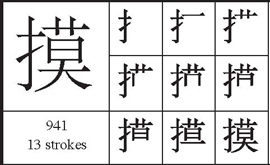
MŌ, to feel with the hand; to grope for; to sneak in or out [B]; to try to find out
The “side-hand” gives the meaning.
摸底 mōdǐ to try to find out the real situation or purpose
抚摸 fǔmō to stroke
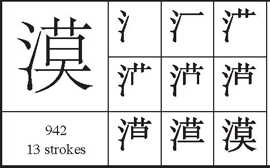
MÒ, desert; be indifferent [B]
Although 莫 mò (939, p. 188) gives the sound, this can be read as a meaning-meaning compound: “water” + “none” = desert.
漠漠 mòmò be foggy; be vast and lonely L6
漠然 mòrán indifferently; apathetically
漠视 mòshì to treat with indifference
沙漠 shāmò a desert L5
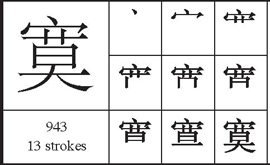
MÒ, be lonely; be deserted [C]
寂寞 jìmò lonely, loneliness L5

MÙ, to admire; to hanker for [B]
爱慕 àimù to love, to adore
慕仰 mùyǎng to look up to
慕名 mùmíng out of admiration for somebody’s famous name
慕尼黑 Mùníhēi Munich (the Bavarian city)
MÙ, tomb [C]
A sound-meaning compound, the 莫 mò (939, p. 188) gives the sound, the importance of the “土 earth” radical is obvious.
墓地 mùdì cemetery
墓碑 mùbēi tombstone, gravestone

MÙ, stage curtain; measure for acts of a play; (movie) screen [C]
The “cloth” radical helps with the meaning.
幕后 mùhòu backstage; behind the scenes
银幕 yínmù the silver screen

XIŪ, to build, to repair; to prune, trim; to study [B] L4
修理 xiūlǐ to fix [B] L6
修改 xiūgǎi to revise [B] L5
修建 xiūjiàn to build [C] L6
修正 xiūzhèng to amend, revise [C]
自修 zìxiū to educate oneself; study period (in school)

SHĚNG, province [A] L4; to save [B]; XǏNG, to reflect, to be awake, to realize
省得 shěngdé lest [C]
省长 shěngzhǎng governor of a province [C]
省会 shěnghuì provincial capital [D] L6
省钱 shěngqián be economical (be saving of money)
河北省 Héběi shěng Hebei Province
反省 fǎnxǐng introspection; self-questioning
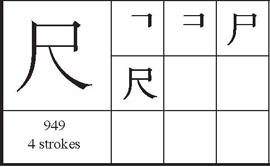
CHǏ, a Chinese “foot” (about 14 English inches); pronounced CHĚ in some compounds; a ruler. FOOT (length) radical (117) [B]
尺寸 chǐcun size (in feet and inches) [C]
尺子 chǐzi ruler [C] L5
市尺 shìchǐ Chinese standard foot
KUĀN, be broad [B] L4
“Roof”+ “grass” + “see.”
宽大 kuāndà be spacious; to fit loosely; be lenient [D]
宽广 kuānguǎng be broad, extensive [D]
宽窄 kuānzhǎi “the broad-narrow of it,” i.e., width
宽厚 kuānhòu be generous
宽容 kuānróng be tolerant
寬

XÌ, 1) department (of a college); system; 2) to connect; be related to; 3) to tie; to haul up or let down on a rope; to remember; be concerned about; to jail [A] L5
关系 guānxi relationship [A] L3
太阳系 tàiyángxì the solar system
社会学系 shèhuìxué xì sociology department
係 (2nd meanings) 繫 (3rd meanings)

XIÀN, a xiàn (“hsien”), administrative district similar to a U.S. county [B] L5
A picture of an inverted head “首.” Current meanings by association or sound-loan.
县城 xiànchéng county seat [C]
县长 xiànzhǎng magistrate of a xiàn [D]

GŌNG, public; male; be equitable; metric; “Mr.”; grandfather [A]
公里 gōnglǐ kilometer [A] L4
公斤 gōngjīn kilogram [A] L2
公园 gōngyuán (public) park [A] L3
公元 gōngyuán Christian era [B] L5
公开 gōngkāi be open; make public [B] L5
公用电话 gōngyòng diànhuà public telephone [B]
公共汽车 gōnggòngqìchē public bus [A] L2
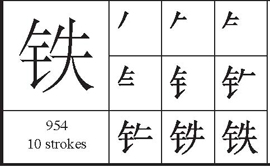
TIĚ, iron; be strong; family name [B]
The “gold” radical helps with the meaning.
铁路 tiělù railroad [B]
铁定 tiědìng to decide definitely
铁丝 tiěsī wire
手无寸铁 shǒu wú cùn tiě be completely unarmed, be defenceless
鐵
TÁI, the name of a group of stars; platform, terrace; desk; stand, base; broadcasting station [B] L4
台风 táifēng typhoon [D] L6
电视台 diànshìtaí television station [B]
(platform) 臺, (typhoon) 颱
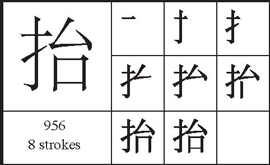
TÁI, to carry (between two or more people); to raise the price [A] L4
A sound-meaning compound, the “hand” radical helps with the meaning.
抬头 táitóu to raise your head; to look up
抬高 táigāo to raise, enhance
檯
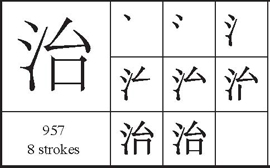
ZHÌ, to govern; to heal, to treat [A]
政治 zhèngzhì politics [A] L5
治理 zhìlǐ to govern [D] L6
治安 zhì’ān public security, law and order [D] L6
医治 yīzhì to heal, to treat [D]
治病 zhìbìng to treat an illness
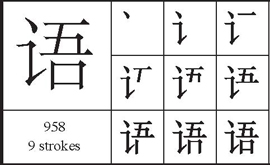
YǓ, language, speech [A]
语言 yǔyán language [A] L4
语法 yǔfǎ grammar [A] L4
语音 yǔyīn speech sounds; pronunciation [B]
语气 yǔqì tone, manner of speaking; (grammatical) mood [B] L5
语文 yǔwén (Chinese) language [C]
四字成语 sìzìchéngyǔ a four-character set expression
語

FÚ, (bookish) not, be unwilling to
This character originally meant “rope” and was a picture of a piece of rope (the “bow” radical) tying two things—now “left” and “down”— 丿丨 together. The meanings “not, be unwilling to” came by sound-loan.
FÈI, to waste; expense, fee; family name [B]
学费 xuéfèi tuition fees [B]
费用 fèiyòng expense [B] L5
公费 gōngfèi at public expense [B]
费力 fèilì to require effort, be strenuous [C]
费心 fèixīn to take trouble over; (polite) Would you mind to...
費

FÓ, Buddha; FÚ, second syllable of 仿佛 fǎngfú, “to seem, to be more or less the same as; as if” [B]
佛教 Fójiào Buddhism
佛祖 fózǔ the Buddha

QÍ, her, his, its, their [A]
其 gives the sound in several characters.
See the next few items
其次 qícì next in order; second [B] L4
其中 qízhōng among, in the midst of [B] L4
其余 qíyú the rest [B] L5
其他 qítā other, else [B] L3
其间 qíjiān among, between [D]
其实 qíshí actually; in fact L3
尤其 yóuqí especially L4

QĪ, period; issue (of a magazine); to expect [A]
期望 qīwàng to look forward to [D] L6
期间 qījiān period of time; during [B] L5
日期 rìqī date (calendrical) [B] L5
期满 qīmǎn to expire
星期 xīngqī week [A] L1
星期日 xīngqīrì Sunday [A]
星期天 xīngqītiān Sunday
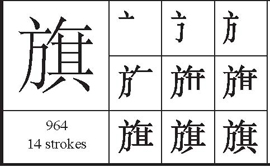
QÍ, flag [B]
旗袍 qípáo woman’s long dress with slit skirt; cheongsam L6
国旗 guóqí national flag
QĪ, to cheat [B]; to deceive
欺负 qīfu to bully; to take advantage of L6
欺骗 qīpiàn to deceive, swindle L6

QÍ, chess, or any similar board game [C]
棋迷 qímí chess fan
棋手 qíshǒu chess player

WÉI, walk off, to walk off in opposite directions; soft leather; family name. WALK OFF radical (91)
韦 used to have “foot” at the top and at the bottom to suggest two feet walking in opposite directions.
韦编三绝 wéibiānsānjué diligent in one’s studies
韋

WÉI, to go around; circumference [A]
To go around in an enclosing wall (口)
包围 bāowéi to surround [C] L6
围巾 wéijīn muffler, scarf [C] L5
围墙 wéiqiáng enclosing wall
圍
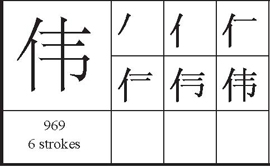
WĚI, be great [A]
The “man” radical helps with the meaning.
伟大 wěidà be mighty [A] L5
伟人 wěirén a great man
伟业 wěiyè a great task
偉
WÉI, to go against, to disobey [B]
违反 wéifǎn to violate, transgress [B] L5
违法 wéifǎ to break the law [D]
违心 wéixīn against one’s conscience
違

YǓN, to consent; be true, sincere [B]
Distinguish from 亢 (1041, p. 209).
允许 yǔnxǔ to permit, permission [B] L4
允从 yǔncóng to assent
允当 yǔndàng be suitable, satisfactory

CHŌNG, to fill up; to pretend to be [B]
Distinguish from 亢 (1041, p. 209).
充分 chōngfèn be adequate [B] L5
充足 chōngzú be sufficient [B] L6
充实 chōngshí be ample, adequate [C] L6
充当 chōngdāng to serve as, act as [D] L6
冒充 màochōng to impersonate L6
(MN) “True” wears a hat, becomes “pretend.”

TǑNG, to control; all; succession [B]
总统 zǒngtǒng president (of a country) [B] L5
传统 chuántǒng tradition; be traditional [B] L5
统一 tǒngyī to unify; unity [B] L5
系统 xǐtǒng system; be systematic [B] L5
统治 tǒngzhì to control [B] L5
統

TUĪ, to push; to elect; to make excuses; to cut, to clip; to deduce [A] L4
推动 tuīdòng to put into action; to promote; to propel [B]
推进 tuījìn give a push to; (military) to advance [B]
推行 tuīxíng carry into operation [D]
推理 tuīlǐ (logic) inference, deduction [D] L6
推三阻四 tuīsānzǔsì make up all kinds of excuses [D]
DÁ, to answer; DĀ, answer [A]
回答 huídá to answer, answer [A] L2
答应 dāyìng to answer, to agree to [B] L5
答案 dá’àn answer, solution [B] L4
答非所问 dáfēisuǒwèn to give an irrelevant answer; irrelevant or evasive answer

HUÒ, goods; currency [B]
A sound-meaning compound, the “cowrie” radical helps with the meaning, “化 huà” once gave the sound.
国货 guóhuò domestic goods (i.e., not imports)
洋货 yánghuò imports (“foreign goods”)
通货 tōnghuò legal tender
貨
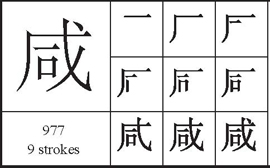
XIÁN, salt; (bookish) all; a family name [C] L4
咸水湖 xiánshuǐhú saltwater lake
咸肉 xiánròu salt pork, bacon
(“salt” only) 鹹
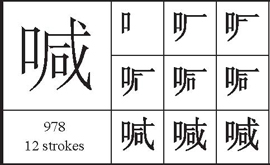
HǍN, to yell [A] L5
喊叫 hǎnjiào to cry out [C]
呐喊 nàhǎn a rallying cry; a battle cry
(MN) To yell “salty-mouth”

GǍN, to feel (emotionally); to move (emotionally); to appreciate [A]
感到 gǎndào to feel, to sense [A]
感冒 gǎnmào the common cold [A] L3
感谢 gǎnxiè to thank, be grateful [A] L4
感动 gǎndòng to move (emotionally) [B] L4
感觉 gǎnjué sense perception; to sense, feel [B] L4
感情 gǎnqíng emotion; affection [B] L4
感想 gǎnxiǎng reflections, thoughts [B] L5
JIǍN, to decrease; “minus” [B]
减少 jiǎnshǎo to decrease, to subtract [B] L4
减产 jiǎnchǎn decline in production [D]
减价 jiǎnjià to cut prices; hold a sale
五减三 wǔ jiǎn sān five minus three
(MN) To decease “salty” “ice”
減

XÍNG, form [B]
形势 xíngshì appearance, conditions of things; pertain to topography, be topo-graphical [B] L5
形容 xíngróng to describe [B] L5
形成 xíngchéng to take shape [B] L5
形式 xíngshì form, shape [B] L5
形像 xíngxiàng image, form [C] L5
情形 qíngxíng circumstances, situation [B] L6
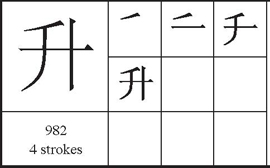
SHĒNG, to ascend, to raise; Chinese dry quart (31.6 cubic inches); quart box [B] L5
升学 shēngxué be promoted to a higher grade in school [D]
升平 shēngpíng be peaceful, peace
一升米 yìshēngmǐ quart of rice
直升机 zhíshēngjī helicopter

DĪ, be low, to lower [A] L3
减低 jiǎndī to reduce [D]
低下 dīxià be low (status, standard of living) [D]
低头 dītóu to bow the head
低声下气 dīshēngxiàqì be meek (literally, “lower your voice and keep down your energy”)
低三下四 dīsānxiàsì be humble, servile

JIÀNG, to descend; to lower, to demote [B]; XIÁNG, to surrender; to control
降低 jiàngdī to drop, to lower [B] L4
下降 xiàjiàng to descend; to drop, fall
降价 jiàngjià to reduce prices [D]
升降机 shēngjiàngjī (somewhat obsolete) elevator (literally, an ascend-and-descend machine); nowadays,
电梯 diàn tī = elevator
ZHÀO, to reflect; to shine on; according to [A]
“Sun” gives the meaning, “召” gives the sound, the “fire-dots” re-emphasizes the meaning.
照常 zhàocháng as usual [B] L5
按照 ànzhào according to ... [B] L4
护照 hùzhào passport [B] L3
照样 zhàoyàng following a model; in the same old way, as before [C] L6
照相 zhàoxiàng to take a photograph [A]
照相机 zhàoxiàngjī camera [C] L3

ÉR, (obsolete) beard; and, and yet, but. BEARD radical (169) [A] L4
而 is a picture of a beard. Other meanings by sound-loan. Distinguish it from “face” 面 (675, p. 136).
而且 érqiě and moreover [A] L3
然而 rán’ér but, moreover [B] L4
而已 éryǐ that’s all [C] L6
而后 érhòu after that, then [D]
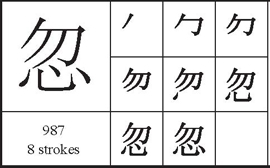
HŪ, suddenly; to neglect [A]
忽然 hūrán all of a sudden [A] L4
忽而... 忽而... hūér... hūér... do one thing one minute, another thing the next
忽而哭忽而笑 hūér kū hūér xiào weep one minute and laugh the next

YUÈ, music; family name [A]; LÈ, happiness; family name [A]
音乐 yīnyuè music [A] L3
快乐 kuàilè be happy, happiness [B] L2
樂

XIÀN, thread, wire; clue [B]
A sound-meaning compound, the “silk” radical suggests the meaning.
毛线 máoxiàn knitting wool [C]
线路 xiànlù (electricity) circuit; (transportation) line, route [C]
视线 shìxiàn line of sight [D] L6
线人 xiànrén stool pigeon; spy, informer
平行线 píngxíngxiàn parallel lines
線
YÓU, postal [A]
“由” gives the sound.
邮包 yóubāo parcel [C]
邮电 yóudiàn post and telecommunications [D]
邮政 yóuzhèng postal service [D]
邮费 yóufèi postage
邮件 yóujiàn mail
郵
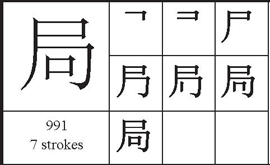
JÚ, office; situation [A]
局部 júbù part [C] L6
局面 júmiàn aspect, phase [C] L6
局势 júshì situation [D] L6
邮局 yóujú post office [A] L5
邮局长 yóujúzhǎng postmaster [B]
警察局 jǐngchájú police station
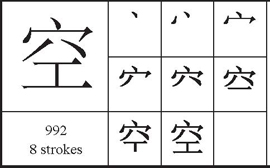
KŌNG, be empty; sky, air; for nothing, in vain; KÒNG, be empty, leave empty; empty space; free time
空气 kōngqì air [B] L4
空间 kōngjiān space [B] L5
空中 kōngzhōng in the sky; overhead [B]
空前 kōngqián be unprecedented [B]
太空 tàikōng outer space [D] L6
空话 kōnghuà empty talk, chatter [D]
空心 kōngxīn be hollow [D]

SÈ, color; looks; kind; desire [A]; SHǍI, color
气色 qìsè complexion L6
好色 hǎosè be lustful
春色 chūnsè spring scenery, happy expression, beautiful face.
色子 shǎizi dice

KÙN, difficulty, hardship; to trap; to maroon; to beseige; to be sleepy [A] L4
困 shows a tree in a box to suggest the idea of “difficulty,” “be in difficulties.”
困睡 kùnshuì be sleepy, tired [A]
困难 kùnnán be difficult, difficulty [A] L4
围困 wéikùn to surround, hem in, besiege
MǍN, be full; be contented, satisfied [A] L4
满意 mǎnyì be satisfied [A] L3
满足 mǎnzú to satisfy [B] L5
充满 chōngmǎn be full of, be brimming with, be permeated with [B] L5
满月 mǎnyuè full moon, a baby’s completion of its first month of life [D]
不满 bùmǎn be resentful, discontent
滿

JIǍO L3, horn; angle; corner; a measure for dimes; role; JUÉ, role. HORN radical (201)
The character is a picture of an animal’s horn.
角度 jiǎodù angle; point of view; perspective [C] L5
直角 zhíjiǎo right angle
牛角 niújiǎo oxhorn
角色 juésè a role, a part; a competent actor or actress, a capable person L5
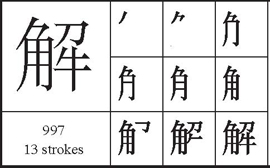
JIĚ, to loosen, to untie [A]
Original meaning might have been to “cut 刀” the “horn 角” of a “cow 牛.”
解决 jiějué to solve; to kill; solution [A] L3
了解 liǎojiě to understand [A] L3
解放 jiěfàng to liberate [B] L5
解答 jiědá to answer, explain [B]
解除 jiěchú to get rid of [D] L6
讲解 jiǎngjiě to explain [D]

ZHĪ, to weave [A]
“Silk” helps with the meaning. 只 zhǐ is, of course, there for the sound.
组织 zǔzhī to organize; organization [A] L4
织造 zhīzào weaving
织毛衣 zhīmáoyī to knit a sweater
織

FÙ, 1) to return; to repeat; to recover; again; to reply; 2) to be complex; to repeat [A]
复习 fùxí to review (lessons) [A] L4
重复 chóngfù to go over, repeat [B]
复活 fùhuó to resuscitate; Resurrection [D] L6
复原 fùyuán to get well again; to restore
复员 fùyuán to demobilize
复写纸 fùxiězhǐ carbon paper
(1st meaning) 復 (2nd meaning) 複
ZÁ, be mixed, be miscellaneous [A]
Modern form looks a bit like “九” + “一” + “小.”
复杂 fùzá be complex [A] L4
杂文 záwén an essay, literary miscellany [C]
杂乱 záluàn be disorderly, jumbled up [D]
杂交 zájiāo to hybridize [D]
雜
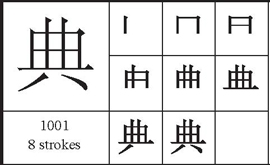
DIǍN, canon, be canonic; to borrow or lend money on security of land or house [A]
A picture of writing tablets on the table.
字典 zìdiǎn dictionary of characters [C] L3
典礼 diǎnlì ceremony, celebration [C] L6
典故 diǎngù classical allusion; historical background

CHÁ, to investigate [A]
查明 chámíng to investigate and prove; to ascertain [D]
查处 cháchǔ to investigate and deal with as appropriate [D]
查点 chádiǎn to check the amount of
查对 cháduì to verify
查字典 chá zìdiǎn to look up in the dictionary
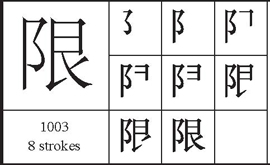
XIÀN, limit [B]
限度 xiàndù limit [D]
限于 xiànyú be limited to [D]
局限 júxiàn to limit, be limited; to confine [D] L6
限定 xiàndìng to set a limit
限量 xiànliàng limit, limited; to estimate
有限 yǒuxiàn be limited; “Ltd.”
无限 wúxiàn be infinite, unlimited

TÍ, to raise; to lift in the hand; rising stroke (in writing); DĪ in some compounds [A] L5
提高 tígāo to raise, enhance [A] L3
提前 tíqián to change to an earlier date; be beforehand [B] L4
提包 tíbāo handbag, tote bag [C]
提问 tíwèn to put questions to [C] L5
提案 tí’àn a motion, proposal [D]
提防 dīfáng to guard against
KĚN, be willing [B]
The modern form looks like “止” + “月.”
肯定 kěndìng to accept; to recognize (e.g., another nation, diplomatically) [B] L4
肯尼亚 kěnníyà Kenya

DŌNG, winter; family name [A] L3
The two dots in this character is no other than the “ice” radical.
冬天 dōngtiān winter [A]
冬至 Dōngzhì Winter Solstice
冬菜 dōngcài preserved, dried cabbage or greens

XIÀ, summer; family name [A] L3
夏天 xiàtiān summer [A]
夏至 Xiàzhì Summer Solstice
夏收 xiàshōu summer harvest
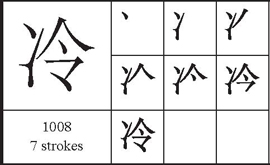
LĚNG, be cold; family name [A] L1
A sound-meaning compound, the “ice”’ radical gives the meaning.
冷饮 lěngyǐn cold drinks
冷淡 lěngdàn be cheerless, be desolate; be indifferent [D] L6
冷清 lěngqīng be deserted, be desolate
干冷 gānlěng be dry and cold (weather)
冷漠 lěngmò be cold and indifferent
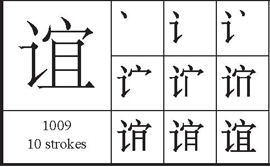
YÌ, friendship [B]
友谊 yǒuyi friendship L4
情谊 qíngyì friendly feelings, brotherhood.
誼
XUÈ, blood. BLOOD radical (181) [B] L4
A picture of a dish “皿” with blood “丿” in it. Colloquially, 血 may be pronounced xiě. Distinguish from the “dish” radical 皿 (138, p. 28).
血汗 xuèhàn blood and sweat; sweat and toil
高血压 gāoxuèyā high blood pressure
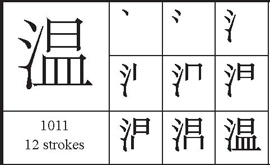
WĒN, be warm; review; family name [B]
What looks like the “sun” radical here was originally a picture of a man in a box—in prison. “Prisoner” over “dish” suggests “feed a prisoner,” whence “be warmhearted, be warm.”
温度 wēndù temperature [B] L4
温带 wēndài temperate zone [C] L6
温习 wēnxí review, study

GĀI, to owe; to be someone’s turn; ought to; the said (aforementioned) ... [A]
应该 yīnggāi ought [A] L3
该当 gāidāng to deserve; should [B]
该死 gāisǐ (colloquial) damned, accursed (oath of disapproval)
该我 gāiwǒ It’s my turn!
該
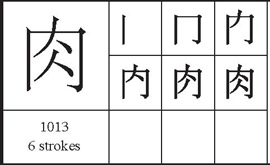
RÒU, meat; fruit pulp; be sluggish [A]
肉 is said to be a picture of dried meat.
牛肉 niúròu beef
羊肉 yángròu mutton, (often) lamb L2
猪肉 zhūròu pork

XĪNG, star, planet; a bit [A]
A sound-meaning compound. The “sun” gives the meaning, “生” once suggested the sound.
星星 xīngxīng star [B]
明星 míngxīng star as in “movie star,” etc. [D] L5
火星 huǒxīng a spark; Mars
JIǍ, to borrow; to be fake, false; JIÀ, vacation [A] L4
放假 fàngjià to have a vacation [A]
假如 jiǎrú if [C] L5
假使 jiǎshǐ if [C] L6
假期 jiàqī vacation time [C]
假牙 jiǎyá false tooth, denture
假意 jiǎyì with false intent

YǓ, to hand over; with; YÙ, to participate in [B] L4
与其 yǔqí rather than [B] L5
与会 yùhuì to participate in a conference [D]
与世无争 yǔ shì wú zhēng not to fight the world; to disdain the rat race
與

JǓ, to lift; to begin; behavior; all [A]* L5
选举 xuǎnjǔ to elect, election [B] L5
举行 jǔxíng to hold (e.g., a meeting) [B] L3
举办 jǔbàn to conduct [C] L4
举头望明月,低头思故乡 jǔ tóu wàng míng yuè, dī tóu sī gù xiāng (I) raise (my) head and look at the bright moon, lower (my) head and think of home (李白 Li Bai)
舉

CHĀ, a fork; to work with a fork; CHǍ, to part so as to make a fork; CHÁ, to jam, block up [B]
Distinguish from character 1020 (p. 204).
钢叉 gāngcha steel fork
叉鱼 chāyú to spear fish

No pronunciation. Radical (25), “bottom of
义” (see next)
YÌ, commitment to the common good; justice; be just; meaning [A]
Distinguish from the preceding character. See note under 仁 (450, p. 91) on Confucian thought on social order.
义务 yìwu duty, obligation; without pay [C] L5
主义 zhǔyì doctrine, -ism [D]
社会主义 shèhuìhǔyì socialism [C]
望文生义 wàng wén shēng yì to take a text too literally
義

YÌ, to discuss [B]
提议 tíyì to propose, a proposal L6
会议 huìyì a meeting, a conference; a council, a congress L3
(MN) Discuss “justice” with “words”
議

YÍ, appearance, bearing; ceremony, rite [B]
仪表 yíbiǎo appearance; meter (measuring apparatus)
仪器 yíqì gadget L6
仪容 yíróng appearance
儀
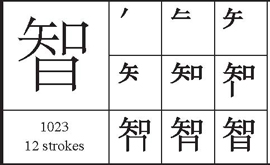
ZHÌ, wisdom, intelligence, IQ [C]
(MN) “知 to know”+ “曰 to say” = wisdom
See note under 仁 (450, p. 91) on Confucian thought on social order.
智慧 zhìhuì intelligence, wisdom L5
智商 zhìshāng intelligence quotient, IQ L6

BÈI, quilt; by (sign of agent in passive construction); to be . . . (sign of passive construction—see
被告 in the examples) [A] L3
被子 bèizi quilt [B] L5
被动 bèidòng be passive [C] L6
被告 bèigào the accused, defendant [D] L6
LÌ, interest (on money); profit; be sharp; family name [A]
Originally, “grain 禾” + “knife 刂” = “to cut the grain,” whence “sharp” and “profit” (from harvest).
利用 lìyòng to make use of [A] L5
净利 jìnglì net profit
复利 fùlì compound interest
吉利 jílì be lucky, be auspicious
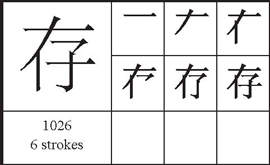
CÚN, to keep, to store; deposit [B] L5
保存 bǎocún to preserve [B]
存放 cúnfàng to entrust to somebody; to deposit [D]
存在 cúnzài to exist, existence [B] L5
存在主义 cúnzàizhǔyì Existentialism
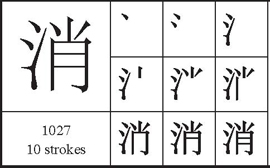
XIĀO, to consume, to abolish, to vanish, to disappear [A]
消息 xiāoxi news, information [A] L4
取消 qǔxiāo to abolish [B] L5
消化 xiāohuà to digest, digestion [B] L5
消费 xiāofèi to consume [B] L5
消除 xiāochú to eliminate, to clear up [C] L6
消极 xiāojí be negative; be passive [C] L6
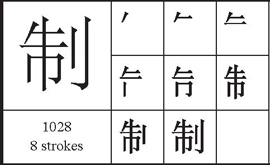
ZHÌ, to measure, to regulate; institution; system; to make, to manufacture [B]
限制 xiànzhì to limit, to restrict [B] L4
制度 zhìdù system [B] L5
制定 zhìdìng to work out (e.g., a plan, a system) [B] L5
制造 zhìzào to make, manufacture [B] L4
制止 zhìzhǐ to stop, put an end to [B] L6
(“to make, to manufacture”) 製
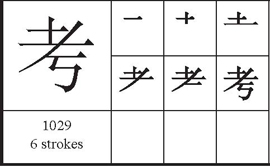
KǍO, to test; to be tested; exam [A]
Original meaning was “old”—which is still a very minor meaning nowadays—very similar to “老.” Current meanings by sound-loan.
大考 dàkǎo final exam
考古 kǎo gǔ to practice archeology; archeology [D] L6
考古学 kǎogǔxué archeology
SHÌ, to try [A] L4
考试 kǎoshì to take or give an exam; exam [A] L2
口试 kǒushì oral exam (C)
笔试 bǐshì written exam (C)
試
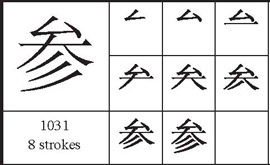
CĀN, to take part in; to refer; to consult; SHĒN, ginseng [A]
参加 cānjiā to take part in [A] L3
参观 cānguān to sightsee [A] L4
参考 cānkǎo to consult, to consider [C] L5
人参 rénshēn ginseng [D]
參
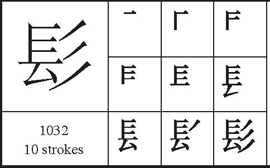
BIĀO, long hair. HAIR radical (220)
The “streaks” radical stands for the hair; the “long” radical gives the rest of the meaning.
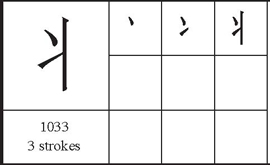
QIĀNG, bed. BED radical (with the form 爿, = radical (42))
This radical is a picture of a bed. The student should distinguish it from 片, the “slice” radical (422, p. 85). “Bed” is now usually written 床, pronounced chuáng (Pt. 2, p. 218a).
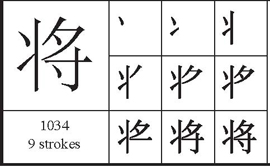
JIĀNG, to take hold of; to be about to; just; to nurture; JIÀNG, a general (military officer) [A]
将来 jiānglái in the future [A] L4
将要 jiāngyào be going to, will do... [B]
将近 jiāngjìn be close to, be almost... [D] L6
将就 jiāngjiu to make do with, to compromise
上将 shàngjiàng a general, an admiral
將
JIǍNG, a prize; to give a prize to, to award [B]
奖金 jiǎngjīn award of money, bonus [C] L4
奖学金 jiǎngxuéjīn scholarship; exhibition [B]
獎
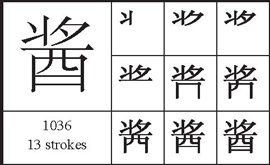
JIÀNG, sauce; (food) paste [B]
“酉 wine” suggests that this character is related to “fermentation”
豆酱 dòujiàng fermented beans in paste form
酱油 jiàngyóu soy sauce L5
(油: see p. 217b) 醬

JIĀNG, to starch; thick fluid, starch [C]
The “water 水” radical helps with the meaning.
浆果 jiāngguǒ berry
豆浆 dòujiāng soybean milk
漿

SHǓ, to belong to; genus, family; be subordinate [B]
属于 shǔyú to belong to, be tantamount to [B] L5
属国 shǔguó dependent territories, colonies
属性 shǔxìng qualities, attributes
屬
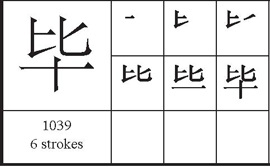
BÌ, to finish; family name [B]
The simplified form is “比” + “十.”
Distinguish from 华 (788, p. 158).
毕业 bìyè to graduate [B] L4
毕生 bìshēng all one’s life
畢
SHÍ, to pick up; to find; ten [A]
The “hand” radical helps with the meaning—to pick up.
This is a form of 十 (ten) used in accounting (to minimize the possibility of error or fraud).
拾取 shíqǔ to pick up, collect

KÀNG, be high, to go high; be haughty [D]
The student should distinguish this character from 允 yún “to consent; be sincere” (971, p. 195) and from 充 chōng “to fill up” (972, p. 195).
高亢 gāokàng be sonorous, resounding
亢进 kàngjìn hyperactive (of a bodily organ—a medical term)

HÁNG, to sail, to navigate [B]
Clearly a sound-meaning compound.
航空 hángkōng aviation; air- [B] L6
航行 hángxíng to sail, fly, navigate [C] L6
航线 hángxiàn shipping/flight route [D]
航运 hángyùn shipping [D]
航海 hánghǎi navigation [D]
航天 hángtiān spaceflight [D] L6
航道 hángdào channel, lane [D]

LǙ, to travel; troops, brigade [A]
旅行 lǚxíng to take a trip, to travel [A]
旅馆 lǚguǎn hotel [B]
旅客 lǚkè traveler, passenger; hotel guest [B]
旅社 lǚshè inn
旅长 lǚzhǎng brigade commander

JÍ, be hurried; be upset; be urgent [A]
着急 zháojí to worry, feel anxious [A]
急忙 jímáng be hassled, busy [B] L5
急切 jíqiè be impatient; in a hurry [D] L6
急症 jízhèng acute disease
急救 jíjiù first aid; emergency treatment
急性子 jíxìngzi to be an impatient type; an impatient type
JÌ, to mail; to entrust; to dwell [A] L4
Original meaning was “to dwell,” thus the “roof” radical.
寄信 jìxìn to mail a letter
寄存 jìcún to deposit; deposits
寄卖 jìmài to consign (goods)
寄件人 jìjiànrén sender

PIÀO, ticket, stamp, bank note, check, document; vote [A] L2
邮票 yóupiào postage stamp [A]
支票 zhīpiào check [D] L5
传票 chuánpiào summons (legal)
票房 piàofáng a place to buy tickets, booking office, box office
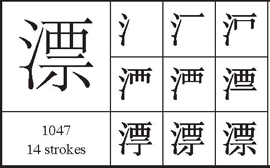
PIĀO, to float, to drift (usually on water: compare with next item); PIǍO, bleach, rinse; 1st syllable of 漂亮 piàoliang be good-looking; be brilliant, outstanding [A]
The “three-dots-water” radical helps with the meaning.
漂浮 piāofú to float L6

PIĀO, to float (in the air or on the water) [B] L5
The “wind” radical helps with the meaning.
飘然 piāorán to float in the air
飘飘 piāopiāo to flutter
飘飘然 piāopiāorán be smug
飄

BIĀO, target; to quote a price; to bid (commercially); sign [B]
标准 biāozhǔn criterion; be standard [B] L4
标点 biāodiǎn punctuation; to punctuate [B] L5
标语 biāoyǔ slogan; poster [C]
标题 biāotí heading, headline, caption [D] L6
標
BÙ, cotton cloth; to publish; to spread, lay out; to announce [A] L5
布告 bùgào notice, bulletin [C] L6
公布 gōngbù to announce, to publish [C] L5
布局 bùjú layout; composition (of a painting, of a piece of writing); arrangement (of pieces on a chess-board [D] L6
幕布 mùbù theater curtain; movie screen
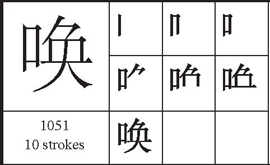
HUÀN, to call out [C]
The “mouth” radical helps with the meaning in this character.
叫唤 jiàohuan to call out [D]
唤起 huànqǐ to incite, to stir up

HUÀN, to exchange [A] L3
换取 huànqǔ to get something by exchange, to barter for something [D]
换钱 huànqián to change money
改换 gǎihuàn to change
换句话说 huàn jù huà shuō in other words

SHÌ, to follow, to chase; be suitable [A]
The “halt” radical suggests “movement” here.
合适 héshì be appropriate [A] L4
适合 shìhé to suit, to fit [B] L4
适当 shìdàng be proper, be suitable [B]
适应 shìyìng to suit, to fit, to match [B] L4
适用 shìyòng to be applicable, to suit [B]
适宜 shìyí be suitable, to fit [C] L6
适时 shìshí be timely
適
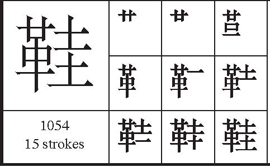
XIÉ, shoe [A] L3
Note the “hide” on the left side, although traditionally Chinese shoes were seldom made of leather.
布鞋 bùxié shoes made of cloth
皮鞋 píxié leather shoes L5
鞋底 xiédǐ shoe sole
鞋跟 xiégēn heel of a shoe
(口 53, 土 34)
DÉ, virtue; personal energy; 1st syllable of 德 国, Germany; family name [B]
Scholars say: The upper righthand part of dé is 真 “be real, be true” (404, p. 81), distorted. With “heart” and “step” (“step” for “action”), dé combines meanings: “true-heartedness in action,” i.e. virtue. This is more of a mnemonic than etymology though.
德语 Déyǔ the German language [B]
( 175)
175)

YÁN, color, face; family name [A]
颜色 yánsè color; countenance [A] L3
容颜 róngyán looks, appearance
颜面 yánmiàn face; prestige, respect
颜如玉 yánrúyù a jade-like beauty
顏

YĀN, smoke; tobacco, cigarette [B]
A sound-meaning compound. The “fire” radical gives meaning, “因” helps with the sound.
吸烟 xīyān to smoke (tobacco) [B]
烟袋 yāndài pipe (for tobacco)
烟鬼 yānguǐ opium addict; nicotine fiend
烟火 yānhuǒ fireworks
煙

CŌNG, smoke-hole, chimney, flue [C]
烟囱 yāncōng chimney, stovepipe

XŪ, to need [A]
需要 xūyào to need, need [A] L3
必需 bìxū be essential, be indispensable [C] L3
需求 xūqiú to require, to demand [D] L6
(MN) A beard “而” in the rain is needed
(雨 368)
TŌU, to steal [B]
偷税 tōushuì to evade tax [D]
偷看 tōukàn to steal a look at, to peep, look at surreptitiously
偷闲 tōuxián to loaf, to shirk
偷偷的 tōutōude stealthily, on the sly [B]

JÌNG, to revere; family name [B]
敬爱 jìng’ài to honor [B] L5
敬礼 jìnglǐ to salute; salutation, formal greeting [B] L6
敬酒 jìngjiǔ to propose a toast, a toast [C]
敬重 jìngzhòng to respect a person
敬而远之 jìng ér yuǎn zhī to respect and stay at a respectful distance from [D]

JǏNG, to warn [B]
Jǐng combines meanings: use “words” to induce “reverence, caution” = “to warn.”
(Karlgren thinks 敬 is phonetic here, or 敬 and 警 stand for cognates. AD 396).
警告 jǐnggào warning; to warn, caution [C] L6
火警 huǒjǐng fire alarm
警报 jǐngbào alarm, warning, siren

CHÁ, to investigate [B]
Roof + worship 祭. Original meaning might have been: to worship the gods in a building and try to find out whether the gods were pleased or not.
观察 guānchá to observe, to survey [B] L5
考察 kǎochá to inspect; to observe and study [C] L6
察看 chákàn to look into
警察 jǐngchá policeman [B] L4
警察局 jǐngchájú police station

YÍN, silver; family name [A] L5
银行 yínháng bank (financial institution) [A] L3
银子 yínzi silver
白银 báiyín silver
银河 yínhé the Milky Way
水银 shuǐyín mercury (literally: liquid silver)
銀
YUĒ, to agree [B]
约会 yuēhuì appointment, date [B] L4
条约 tiáoyuē treaty [B] L6
约束 yuēshù to restrain, to keep within bounds [D] L6
失约 shíyuē to miss an appointment [D]
约定 yuēdìng to agree to
約

QIÓNG, be poor, be impoverished [B] L4
穷人 qióngrén poor people [C]
穷苦 qióngkǔ be poverty-stricken [D]
穷忙 qióngmáng be busy without purpose
哭穷 kūqióng to complain about being poor; to go about pleading pov erty
贫穷 pínqióng be poor, needy
(MN) Poor men live in a cave (穴) and make a living on labor (力)
窮
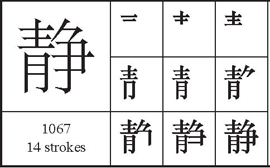
JÌNG, be quiet, be peaceful; family name [A]
“青”+ “争.” The etymology is somewhat disputed.
安静 ānjìng be quiet [A] L3
静电 jìngdiàn static electricity
静止 jìngzhǐ be motionless, be static
(青 249, 争 709)
* Perhaps more correctly, for euphonic reasons, 好累呀 hǎo lèi ya. For 呀, see 672, p. 135.
* The meanings “lining; inside, in,” and the related grammatical function, are a different word than “village.” They attach to this character because 里 is now also used as a sound-loan for a word that, before the script reform, was written with the “gown” radical: 裏 or 裡.
* In Han-Ying Cidian, 乡 is one of the 11 “left-over” characters, not classified under a radical.
* See 450, p. 91, on 礼 ’s significance in Confucian China. In the traditional character (see bottom right, this frame), the right half is a ritual dish holding flowers.
* Karlgren, in “Word-classes in Chinese” (Bulletin of the Museum of Far Eastern Antiquities V (1933)) and “Cognate Words in the Chinese Phonetic Series” (BMFEA XXVIII (1956)) advances the idea that a common phonetic in a series of characters may indicate the scribes’ belief that the words of the series are cognate.
* Note the typical versatility of the Chinese verb here: 1) 可怕, can/should be feared (passive); 2a) 怕 人, fears people (is shy) (transitive); 2b) 怕人 causes people to fear (transitive-causative). (The terms “passive,” “transitive,” etc. here are not intended to be part of an analysis of Chinese grammar, but rather a “quick and dirty” way to help native speakers of English and other Indo-European languages deal with Chinese verbs and get from Chinese sentences the same picture as the Chinese speaker has in his/her mind.)
* In Han-Ying Cidian, 民 is one of 11 “left-over” characters, not classified under a radical.
* Karlgren, however, sees a semantic (or metonymic) progression: elephant → ivory → carved ivory → carved things generally → portrait, statue (AD 797).
* 加以 may also appear before two-syllable verbs with a resumptive function: Example: “ 选择他们 的长处加以跟从 xuǎnzé tāmende chángchu jiāyǐ gēncóng (I’ll) pick out their good points and thereto follow” (Confucius, the English version is intended to be illustrative, not idiomatic); or “A 加以 VERB,” “as to A, … . ” 择: Pt. 2, p. 220b.
* In Han-Ying Cidian, 举 is one of the 11 “left-over” characters, not classified under a radical.